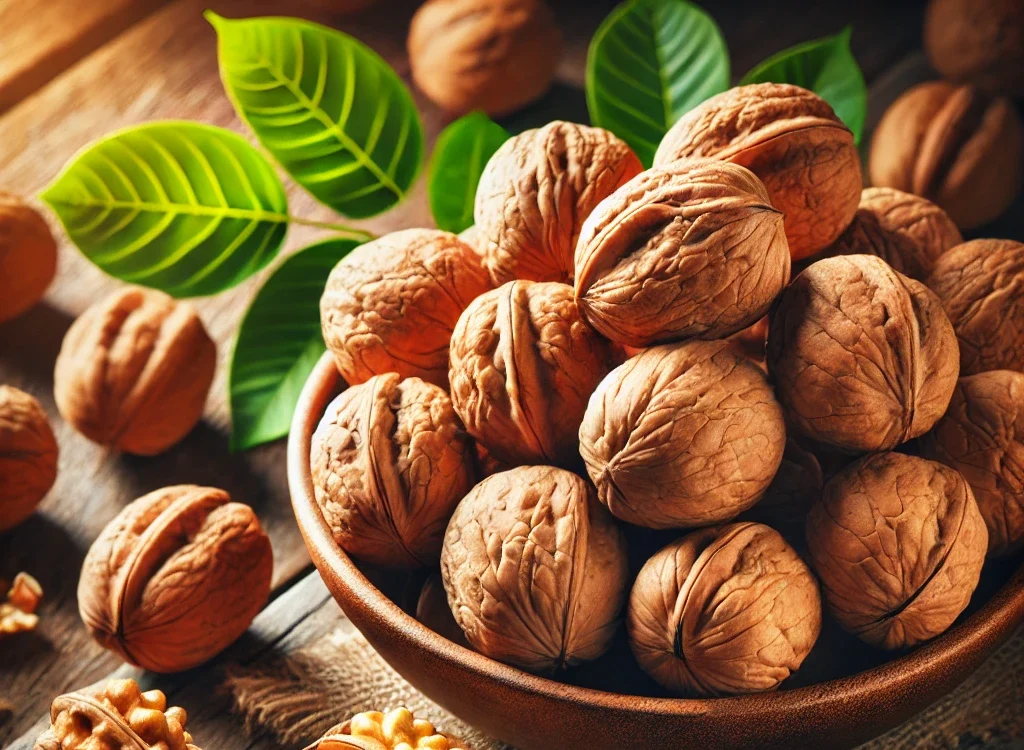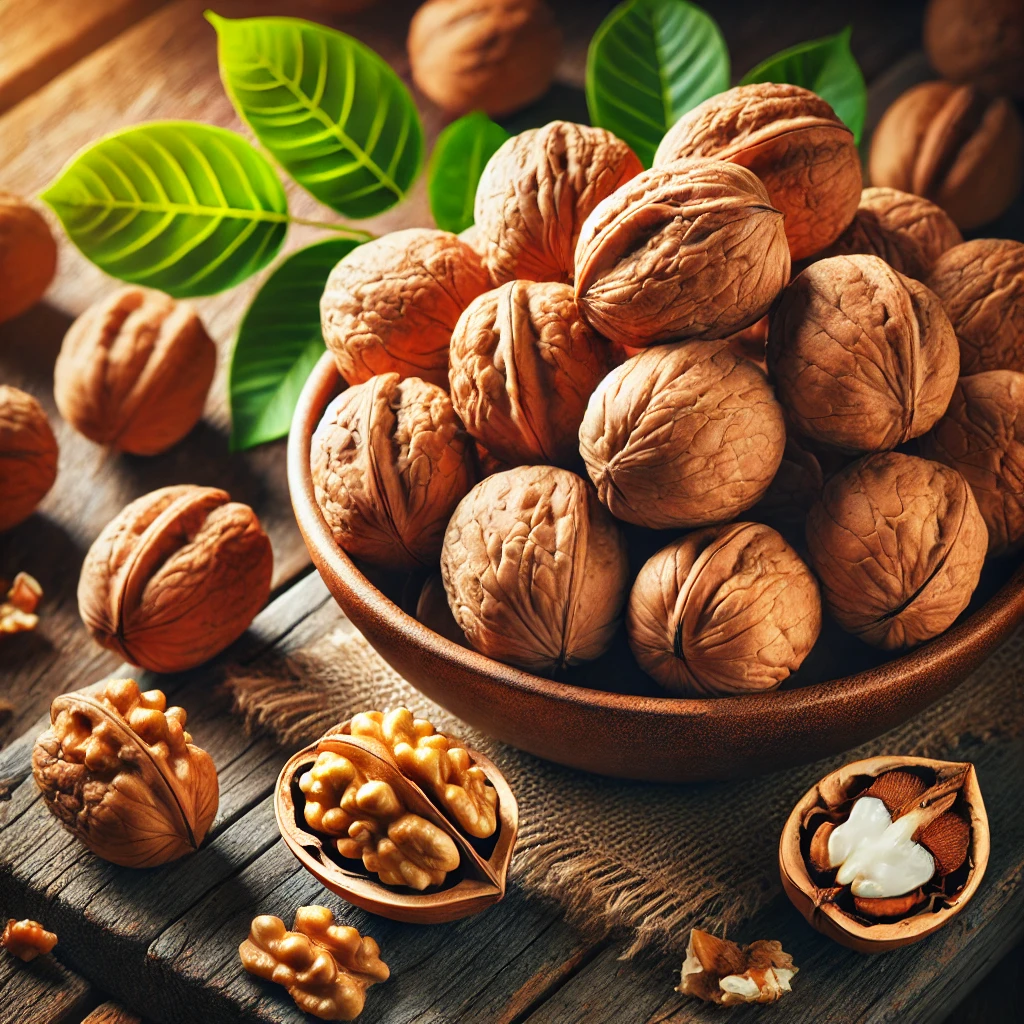Introduction:
Walnuts, often revered as brain-shaped nutritional powerhouses, are more than just a tasty addition to your trail mix or salad. These tree nuts, derived from the Juglans genus, have been consumed for centuries and are celebrated not only for their delightful flavour but also for their numerous health benefits. In this article, we delve into the nutritional composition and explore the various ways walnuts contribute to overall well-being.
Nutritional composition
A 1-ounce (30-gram) serving of walnuts — about 14 halves — provides the following nutrients:
- Calories: 185
- Water: 4%
- Protein: 4.3 grams
- Carbs: 3.9 grams
- Sugar: 0.7 grams
- Fiber: 1.9 grams
- Fat: 18.5 grams
Nutritional Profile:
Walnuts boast an impressive nutritional profile, making them a valuable addition to a balanced diet. They are rich in omega-3 fatty acids, which are essential for brain health and have anti-inflammatory properties. Additionally, walnuts are a good source of protein, fibre, vitamins, and minerals, including vitamin E, magnesium, and phosphorus. Combining these nutrients makes walnuts a nutrient-dense food with a range of health benefits.
The Green Gold: Exploring the Wonders of Avocado
Heart Health:
One of the most well-known benefits of walnuts is their positive impact on heart health. The omega-3 fatty acids found in walnuts, particularly alpha-linolenic acid (ALA), have been linked to a reduced risk of heart disease. These healthy fats help lower cholesterol levels, decrease inflammation, and improve arterial function. Regular consumption of walnuts may contribute to maintaining a healthy heart and reducing the risk of cardiovascular issues.
Brain Boost:
The brain-shaped appearance of walnuts is more than just a coincidence – they are often considered a “brain food” due to their high omega-3 fatty acid content. These fatty acids are crucial for cognitive function and may help support brain health. Some studies suggest that regular walnut consumption could be associated with improved memory and cognitive function, making them a tasty and nutritious snack for those looking to support their brain health.
Weight Management:
Contrary to the misconception that nuts contribute to weight gain, walnuts can be a helpful addition to a weight management plan. The combination of protein, fibre, and healthy fats in walnuts promotes a feeling of fullness, potentially reducing overall calorie intake. Including a moderate portion of walnuts in your diet may help with weight maintenance and provide a satisfying and nutritious snack option.
Antioxidant Properties:
Walnuts are rich in antioxidants, including polyphenols and vitamin E, which play a crucial role in protecting cells from oxidative damage. Antioxidants help neutralize free radicals in the body, which can contribute to various chronic diseases and ageing. The presence of these antioxidants in walnuts adds another layer of health benefits, contributing to overall well-being.
Incorporating Walnuts into Your Diet:
There are numerous ways to enjoy the health benefits of walnuts. They can be eaten on their own as a snack, added to salads, cereals, or yoghurt, or incorporated into baked goods and savoury dishes. Including a handful of walnuts in your daily diet can be a simple and delicious way to reap the nutritional rewards they offer.
Culinary Versatility:
Walnuts not only provide a myriad of health benefits but also contribute a unique flavour and texture to various dishes. Their versatility extends beyond snacking and can elevate both sweet and savoury recipes. Crushed walnuts can be sprinkled over oatmeal or added to smoothies for a delightful crunch, while toasted walnuts can be a flavorful topping for salads or a key ingredient in pesto. Incorporating walnuts into your culinary repertoire not only enhances nutritional intake but also adds a rich, nutty dimension to your meals.
Omega-3 Fatty Acids and Inflammation:
The omega-3 fatty acids in walnuts, particularly ALA, play a crucial role in reducing inflammation throughout the body. Chronic inflammation is linked to various health issues, including cardiovascular disease and arthritis. By including walnuts in your diet, you can harness the anti-inflammatory properties of these nuts, potentially contributing to a healthier and more balanced inflammatory response.
Diabetes Management:
Emerging research suggests that walnuts may have benefits for individuals with diabetes. The combination of healthy fats, fibre, and protein in walnuts can contribute to better blood sugar control. While more research is needed, incorporating walnuts into a well-balanced diet may be a sensible choice for those looking to manage blood sugar levels.
Skin Health:
The antioxidants in walnuts, including vitamin E and polyphenols, can also benefit your skin. These compounds help protect the skin from oxidative stress and may contribute to a healthier complexion. Including walnuts in your diet, along with a skincare routine, can be a holistic approach to promoting radiant and healthy skin.
“EMPOWERING STRATEGIES FOR ECOLOGICAL BALANCE”
Sustainability and Environmental Impact:
Beyond personal health, choosing walnuts can also be a sustainable choice. Walnuts are a relatively eco-friendly nut option compared to some other varieties. The trees are hardy and resilient, requiring less water than certain crops. Additionally, the shells of walnuts are often used for various purposes, including as a natural abrasive in cleaning products, minimizing waste.
Buying and Storing Tips:
When purchasing walnuts, opt for raw or dry-roasted varieties to maximize their nutritional content. Store them in a cool, dry place to prevent rancidity, or refrigerate them for a longer shelf life. It’s advisable to consume walnuts in moderation, as they are calorie-dense, but their nutrient density makes them a worthwhile addition to a balanced diet.
Proper storage is essential to maintain the freshness and nutritional quality of walnuts. Here are some tips on how to store walnuts effectively:
-
Cool and Dry Environment:
- Store walnuts in a cool, dry place. Ideally, this would be in a pantry or cupboard away from direct sunlight.
- Avoid storing walnuts in areas with high humidity, as moisture can lead to mould growth and spoilage.
-
Refrigeration:
- To extend the shelf life of walnuts, consider storing them in the refrigerator. The cool temperature helps slow down the oxidation process and reduces the risk of rancidity.
- Place walnuts in a sealed, airtight container or a resealable plastic bag before refrigerating them to prevent them from absorbing odours from other foods.
-
Freezing:
- For even longer-term storage, walnuts can be stored in the freezer. This is particularly useful if you buy walnuts in bulk.
- Divide the walnuts into small portions and place them in airtight containers or freezer bags. Make sure to remove as much air as possible to prevent freezer burn.
-
Avoid Exposure to Light:
- Light can contribute to the breakdown of the healthy fats in walnuts, leading to a decrease in flavour and nutritional quality.
- Store walnuts in opaque containers or packaging to protect them from exposure to light.
-
Sealed Containers:
- Use airtight containers to keep walnuts fresh and prevent them from absorbing odours from the surrounding environment.
- If purchasing walnuts in bulk, transfer them to a sealed container with a tight-fitting lid once opened.
-
Check for Freshness:
- Periodically check stored walnuts for signs of spoilage, such as a rancid smell or off-taste.
- Discard any walnuts that appear mouldy, discoloured, or have an unpleasant odour.
-
Use in a Timely Manner:
- While walnuts have a decent shelf life, it’s a good practice to use them within a reasonable timeframe to enjoy their optimal flavour and nutritional benefits.
-
Store Shelled and Unshelled Separately:
- If storing both shelled and unshelled walnuts, keep them in separate containers. Shelled walnuts have a higher surface area exposed to air, making them more susceptible to oxidation.
Conclusion:
In conclusion, walnuts are not only a health-conscious choice but a delightful addition to your culinary adventures. From enhancing the flavour of your morning yoghurt to providing a satisfying crunch in a savoury dish, the possibilities with walnuts are vast. As you savour the rich, nutty taste, you can also relish the fact that you are nourishing your body with a variety of essential nutrients and contributing to your overall well-being. So, go ahead—embrace the walnut, nature’s compact package of health and culinary delight.







